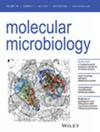Chaperones Hsc70 and Hsp70 play distinct roles in the replication of bocaparvovirus minute virus of canines
IF 2.6
2区 生物学
Q3 BIOCHEMISTRY & MOLECULAR BIOLOGY
引用次数: 0
Abstract
Minute virus of canines (MVC) belongs to the genus伴侣蛋白 Hsc70 和 Hsp70 在犬细小病毒复制过程中发挥不同作用
犬细小病毒(MVC)属于副粘病毒科 Bocaparvovirus 属(前身为 Bocavirus),在全球范围内会导致新生犬出现严重的呼吸道和胃肠道症状。病毒感染的成功有赖于病毒生命周期各阶段宿主因子的成功招募。然而,人们对 MVC 与宿主细胞之间的相互作用知之甚少。在这项研究中,我们发现两种细胞蛋白(Hsc70和Hsp70)与MVC的NS1和VP2蛋白相互作用,Hsc70/Hsp70的两个结构域都是它们相互作用的介质。功能研究发现,MVC 感染会诱导 Hsp70,敲除 Hsc70 会大大抑制 MVC 的复制,而敲除 Hsp70 则会显著促进 MVC 的复制。有趣的是,低量过表达的 Hsp70 会增强病毒蛋白的表达和病毒的产生,而大量过表达的 Hsp70 则会削弱病毒蛋白的表达和病毒的产生。Hsp70过表达后,我们观察到病毒蛋白的泛素化随着Hsp70的过表达而改变,蛋白酶体抑制剂(MG132)恢复了病毒蛋白的积累。此外,我们还验证了 Hsp70 家族抑制剂能显著减少 MVC 复制。总之,我们发现 Hsc70 和 Hsp70 与 MVC NS1 和 VP2 蛋白相互作用,并参与 MVC 复制,这可能为抗 MVC 方法提供了新的靶点。
本文章由计算机程序翻译,如有差异,请以英文原文为准。
求助全文
约1分钟内获得全文
求助全文
来源期刊

Molecular Microbiology
生物-生化与分子生物学
CiteScore
7.20
自引率
5.60%
发文量
132
审稿时长
1.7 months
期刊介绍:
Molecular Microbiology, the leading primary journal in the microbial sciences, publishes molecular studies of Bacteria, Archaea, eukaryotic microorganisms, and their viruses.
Research papers should lead to a deeper understanding of the molecular principles underlying basic physiological processes or mechanisms. Appropriate topics include gene expression and regulation, pathogenicity and virulence, physiology and metabolism, synthesis of macromolecules (proteins, nucleic acids, lipids, polysaccharides, etc), cell biology and subcellular organization, membrane biogenesis and function, traffic and transport, cell-cell communication and signalling pathways, evolution and gene transfer. Articles focused on host responses (cellular or immunological) to pathogens or on microbial ecology should be directed to our sister journals Cellular Microbiology and Environmental Microbiology, respectively.
 求助内容:
求助内容: 应助结果提醒方式:
应助结果提醒方式:


